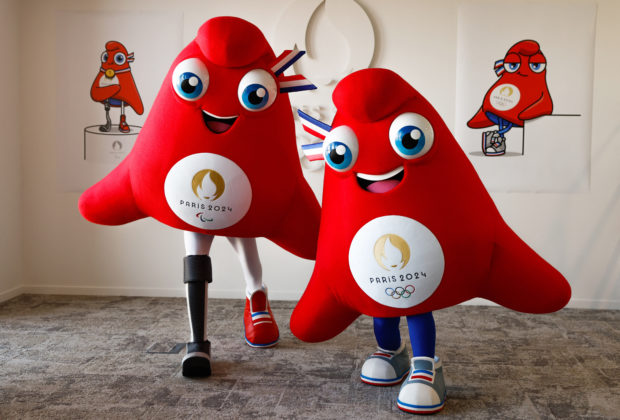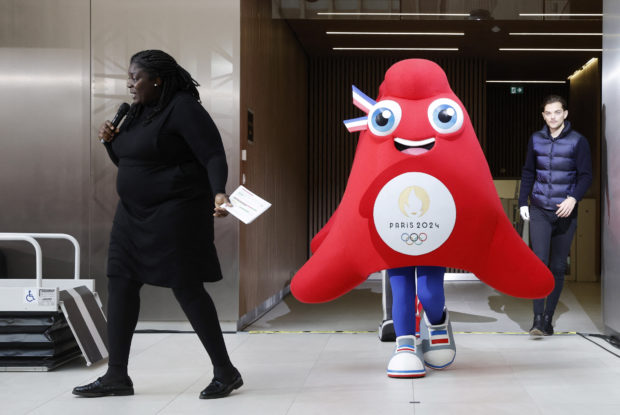Red faces in France over Paris Olympic mascots made in China

General view as the Paris 2024 Olympic and Paralympic mascots the Phryges are unveiled on November 11, 2022. REUTERS/Gonzalo Fuentes
The choice by Paris 2024 Olympics organizers of a cuddly red Phrygian cap as the Games’ mascot is proving a harder sell than expected, after critics pounced on the fact that most will be made in China — and others couldn’t help seeing a symbol of feminine sexuality.
Unveiled on Monday, the plump red triangles named the Phryges are meant to evoke the French Revolution, when anti-monarchists wore the cap that is nowadays seen on the Marianne icon of Liberty, Equality and Fraternity in nearly all public buildings.
Article continues after this advertisement“The Phrygian cap is a symbol of liberty,” Tony Estanguet, a canoeing champion who is president of the Paris 2024 organizing committee, told reporters.
But even though two French toymakers got the contract, the Paris Olympics committee said just eight percent of the mascots would be made in France — from Chinese-produced materials — and the remainder outsourced to China.
The Ethic business owners’ association denounced “an insult to all French companies” and said there was still time to produce the millions of toys at home.
Article continues after this advertisement“I would love to, and we’re working so that France can have the raw materials and textile factories for making two million dolls in a few months, but the fact is that today we cannot do it,” government spokesman Olivier Veran said on Thursday.
“It’s a structural problem due to the fact that for years, France has lost its factories,” he told France 2 television.
Climate activists also contrasted the pollution that will be generated from shipping the toys to France with the government’s pledge to take stronger action against global warming.
France’s environmental transition minister, Christophe Bechu, called the decision to outsource “a problem”.
“I would like to believe that we still have a few months before the Games begin to rectify this,” he told France Info radio on Tuesday.
“We’re not going to find ourselves, at a time when we’re saying we need local distribution networks and re-industrialization, producing mascots on the other side of the world, especially when we’re defending the fight against global warming,” he said.
The Paris Games organizers defended the fact that the mascots are almost all made in China, “like the great majority of toys sold in France”.
‘All the better’

General view as the Paris 2024 Olympic and Paralympic mascots the Phryges are unveiled on November 11, 2022. REUTERS/Gonzalo Fuentes
But officials have yet to comment publicly on another controversy — widespread mockery on social media that the red triangles appear to better resemble a clitoris.
“A symbol of the capital that is both revolutionary and feminist,” left-leaning daily Liberation said in an editorial Thursday.
“From a political viewpoint, it’s not bad for Paris to distance itself from the eternally phallic Eiffel Tower,” it quipped.
The mascot was designed by a team led by Joachim Roncin, who created the stark “I Am Charlie” logo that gained worldwide notoriety in the wake of the January 2015 jihadist massacre at the satirical Charlie Hebdo magazine in Paris.
“If people see a clitoris, and they know how to recognize a clitoris, good for them,” Roncin told the Brut video site in an interview published Wednesday.
“In a logo, everyone is going to see what they want to see: If people see a clitoris, all the better.”
Others on social media noted the mascot bore a striking resemblance to the giant inflatable clitoris set up by feminist activists opposite the Eiffel Tower to mark International Women’s Day in March 2021.
If nothing else, the mascot is being hailed in some quarters as a chance to bring awareness of female anatomy to the mainstream.
“The Phryges might only propagate a very approximate image that people have of the clitoris. So maybe we can ask science teachers to redesign the mascots,” Francoise Cahen, a widely followed high-school teacher in a Paris suburb, posted on Twitter.
RELATED STORIES
Paris Olympics face tough hurdles with two years to go
Paris 2024 to be ‘light at the end of the tunnel’ says next Games chief
Follow Inquirer Sports’ special coverage of the Paris Olympics 2024.